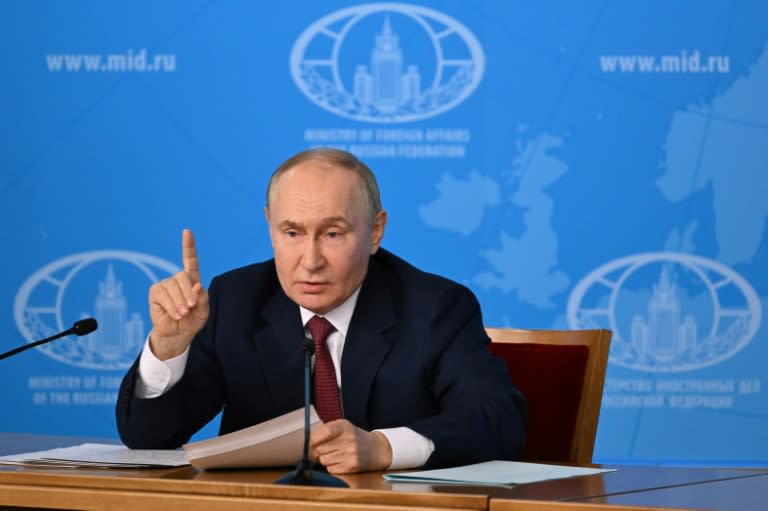Ukraine summit to open in Switzerland, seeking path to peace

World leaders were set to join Ukrainian President Volodymyr Zelensky on Saturday for a summit on peace in his country. But without Russia in attendance, it is being seen as merely a first step in a long process.
Switzerland, which is hosting the two-day gathering at the luxury Burgenstock mountain resort, has sought to temper expectations, framing the event as laying the groundwork for a path to peace, with future summits envisioned involving Moscow.
But in a combative speech on Friday, Russian President Vladimir Putin slammed the conference, and demanded that Kyiv effectively surrender before any actual peace negotiations.
Zelensky branded Putin's demands a territorial "ultimatum" reminiscent of Nazi Germany's dictator Adolf Hitler, while NATO and the United States also immediately rejected the hardline conditions.
"What we need is not a dictated peace but a just and equitable peace which takes into account Ukraine's (territorial) integrity and sovereignty," German Chancellor Olaf Scholz told broadcaster ARD before heading to the summit.
- 92 countries taking part -
The conference, convening exactly 100 countries and global institutions, comes at a perilous moment for exhausted Ukrainians and outgunned soldiers, more than two years since Moscow launched its full-scale invasion in February 2022.
More than 50 heads of state and government figure among the attendees, including all of the G7 leaders who have been meeting in Italy -- with one notable exception.
US President Joe Biden is instead sending his Vice President Kamala Harris.
"I look forward to standing with our allies and partners in support of Ukraine's effort to secure a just and lasting peace," Harris said on X before leaving for the summit.
She is due to meet Zelensky shortly after her helicopter sets down in Burgenstock.
The leaders of Britain, Canada, France, Germany, Italy and Japan are attending, as is the European Union chief and the leaders of Argentina, Colombia, Chile, Fiji, Finland, Ghana, Kenya and Poland.
Russia's BRICS allies Brazil and South Africa are meanwhile only sending an envoy, and India will be represented at the ministerial level.
China is absent, insisting it will not take part without Moscow's presence.
- Low hopes on front line -
After almost a year of stalemate, Ukraine was forced to abandon dozens of frontline settlements this spring, with Russian troops holding a significant advantage in manpower and resources.
Near Ukraine's embattled eastern front, hopes for any major breakthrough are nearly nil.
"I'd like to hope that it will bring some changes in the future. But, as experience shows, nothing comes of it," Maksym, a tank commander the Donetsk region, told AFP.
And in Kyiv, Victoria, a 36-year-old energy industry worker, said she was "exhausted" by the war and wanted to believe the summit would help end it.
But, she said, "I'm a realist in life, so I don't have high hopes."
Experts have also warned against too-high expectations from the gathering.
"Meaningful negotiations that could truly end the devastating war in Ukraine remain out of reach, as both Kyiv and Moscow stick to theories of victory that amount to outlasting the other," the International Crisis Group think tank said.
"Kyiv and its backers will be hard pressed to get tangible results from the meeting."
- G7 $50 bn, security deal -
But since mid-May, Russian progress has slowed and Zelensky hopes to swing the momentum further with the back-to-back G7 and peace summits.
Zelensky arrived at Burgenstock on Friday evening after the G7 summit agreed to offer a new $50-billion loan for Ukraine, using profits from the interest on frozen Russian assets.
Leaders of the Group of Seven rich democracies said they would support Ukraine "for as long as it takes".
Zelensky said the new loan would go towards "both defence and reconstruction", while Putin branded the move as "theft", warning it would "not go unpunished".
Meanwhile, a landmark 10-year security deal signed by Zelensky and Biden on Thursday will see the United States provide Ukraine with military aid and training, with Zelensky calling it a bridge to joining the NATO defence alliance.
Also on Friday, the EU's 27 member states agreed "in principle" on beginning accession negotiations with Ukraine.
- Nuclear, food, humanitarian focus -
The summit is being held at the ultra-exclusive Burgenstock hotel complex perched high above Lake Lucerne in classic picture-postcard Swiss scenery.
The summit aims to find paths towards a lasting peace for Ukraine, based on international law and the United Nations Charter; a possible framework to achieve this goal; and a roadmap as to how both parties could come together in a future peace process.
A plenary session involving all delegations will be held on Saturday.
On Sunday, three topics will be discussed in detail in working groups: nuclear safety, freedom of navigation and food security, and humanitarian aspects.
These will look at Black Sea shipping, prisoners of war, civilian detainees and deported children.
A second summit is envisaged. Zelensky's chief of staff Andriy Yermak said on Tuesday that Kyiv hoped Russia would attend and receive a "joint plan" presented by the other attendees.
Samuel Charap, a Russia expert at the RAND think tank, said of the Swiss summit: "Russia is clearly going out of its way to demonstrate its pique with it... That tells you something.
"Avoiding the expansion of the pro-Ukraine coalition -- they're concerned about this," he told AFP.
rjm-nl-burs/gil


